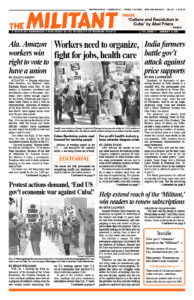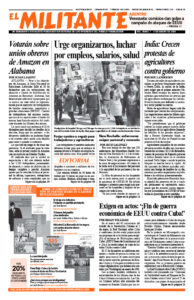January 8, 1996
LAWRENCE, Massachusetts — “Everyone knew it was a time bomb waiting to go off,” Pedro Bares, a production worker from the apparel division, described the fire that consumed the Malden Mills textile plant December 11. Thirty workers were hospitalized, a dozen of whom were in critical condition one week after the blaze. In the end 2,400 people were left jobless.
The fire began where a synthetic upholstery fabric was produced. Workers report that a boiler exploded. A similar explosion in 1993 left six workers hospitalized. Nothing had been changed in the way production was organized.
”We have had safety problems for a long time. We knew something would happen — it was just a matter of time,” explained Willie Sanabria, who was working at the time of the explosion.
“Co-workers ensured that everyone was accounted for,” Julio Soto said.
January 15, 1971
The uprising of Polish workers last month culminated with a major upheaval of the country’s top leadership. The revolt, which began in Gdansk, triggered by huge hikes in the price of food, clothing and fuel, spread quickly, affecting at least a half dozen major cities and tens of thousands of workers.
“What happened in Gdansk was a revolution — and a successful one,” Swedish reporter Kurt Karlsson, who was there, wrote.
The New York Times Dec. 31 wrote: “The shipyard workers returned to the yards and began a sit-in strike. By the next day, other workers joined them and strike committees had been formed.”
A significant development was the frankness that several Polish newspapers began to express. The weekly Polityka stated that “the party is responsible for the causes that gave rise to the tragic events.”
January 5, 1946
Battle weary, homesick marines, forced to remain in China to support the brutal Chiang Kai-shek dictatorship, know Japanese troops are being used against the Chinese Stalinist forces. A Stars and Stripes correspondent reports officers have been “afraid the marines’ rigid training and discipline would not be sufficient to check the tide of resentment.”
The troops refuse to believe it is necessary for them to guard Chinese railroads and British-owned coal mines.
Wall Street is completely indifferent to the effect of war on American soldiers. Washington is anxious to protect imperialist interests and bolster up dictator Chiang Kai-shek. They act as they do because there, as in other parts of the Far East, the fate of the colonial system in the most populous area of the world is at stake in the outcome of the conflict.

